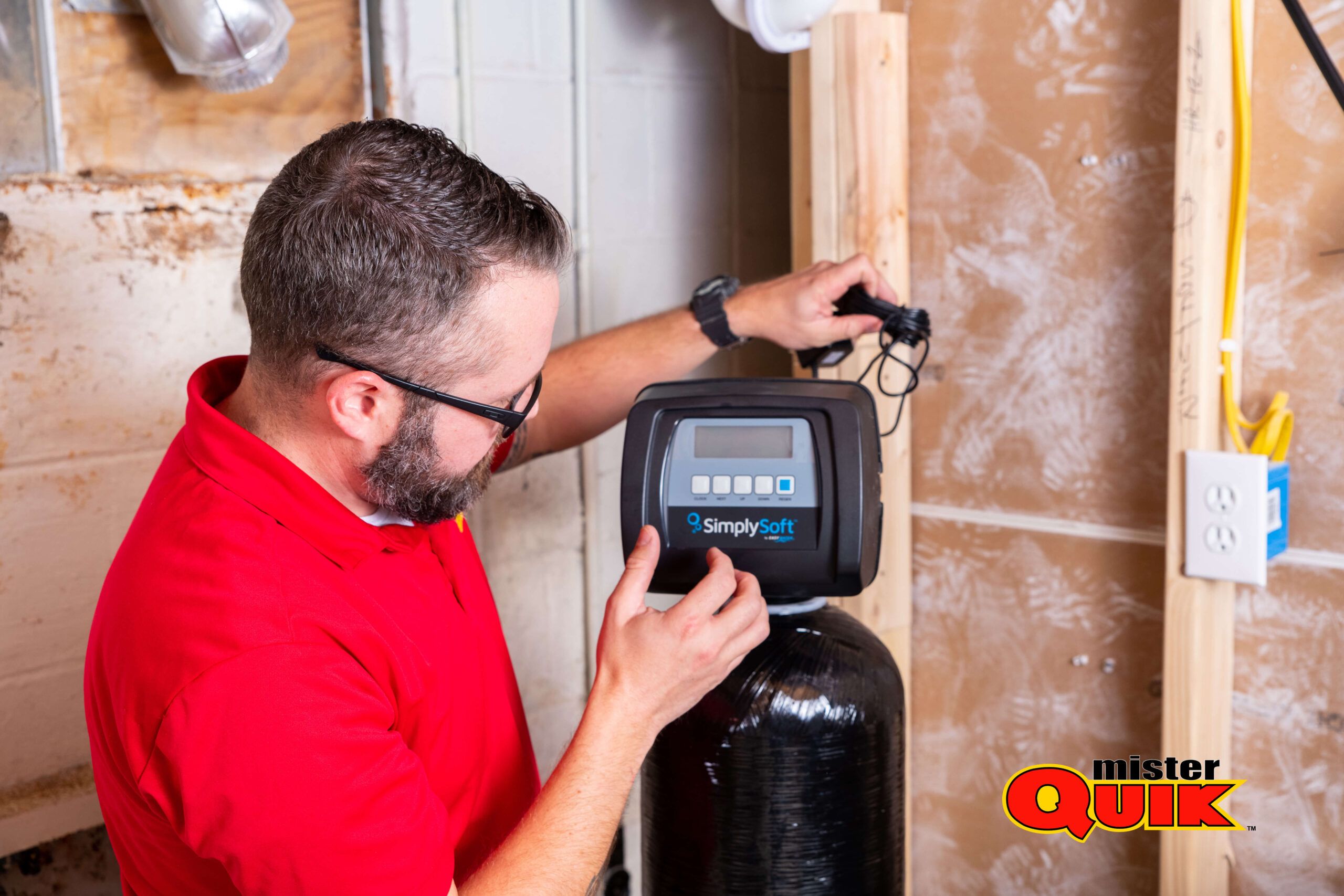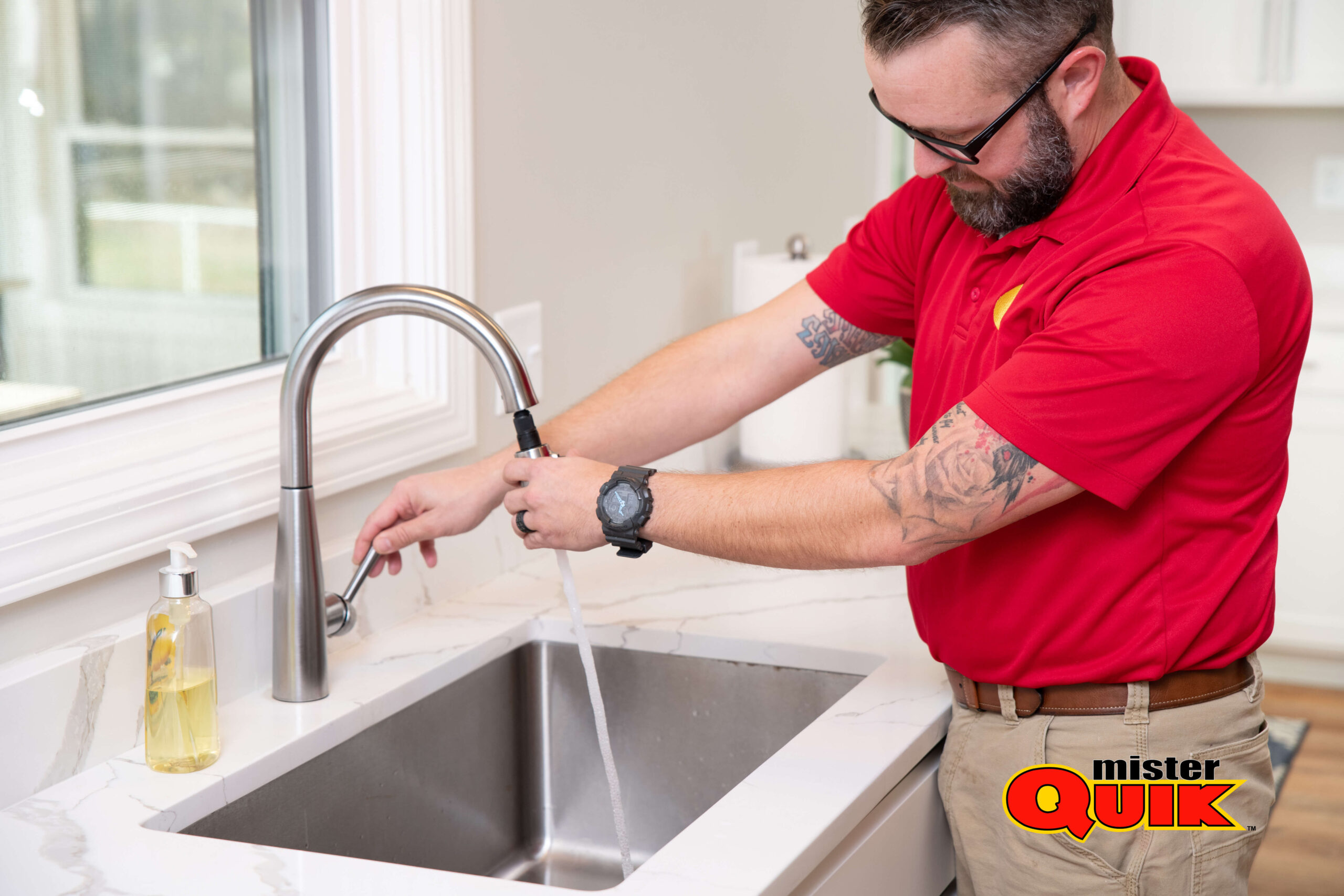Indianapolis Hard Water

Causes of hard water
Ever notice cloudy dishes, difficulty lathering soap, or even dry, itchy skin after showering? These could be signs of Indianapolis hard water. But what exactly makes the water in our city so “hard”?
Mineral Mischief:
The main culprits behind hard water are dissolved minerals, primarily calcium and magnesium. These minerals naturally occur in rocks and soil and can find their way into your water supply through:
- Underground aquifers: As water travels through these natural reservoirs, it can pick up minerals from the surrounding rocks.
- Pipes: Certain pipe materials, like old galvanized steel, can leach minerals into the water.
Indianapolis’ Limestone Connection:
Indianapolis, like many parts of the Midwest, sits on limestone bedrock. This rock is rich in calcium and magnesium, contributing significantly to the city’s Indianapolis hard water. As water travels through these limestone deposits, it dissolves these minerals, making it “hard.”
The Impact of Hardness:
While not a health hazard, hard water can cause various inconveniences:
- Reduced cleaning power: Soap struggles to lather in hard water, leading to:
- Increased soap use
- Residue on dishes, clothes, and skin
- Mineral buildup: Hard water minerals can accumulate in appliances like:
- Water heaters
- Washing machines
- Reducing their efficiency and lifespan
- Skin and hair issues: Hard water can irritate some people’s skin and scalp, causing dryness or itchiness.
How to know if you have hard water
Living in Indianapolis, you might be wondering if your tap water falls victim to the common culprit – Indianapolis hard water. But how can you tell for sure? Here are some signs to watch for and steps to take:
Telltale Signs of Hard Water:
Notice a filmy residue on dishes, glasses, or even your shower doors after cleaning? Hard water minerals can make soap less effective, leaving behind this unwanted film.
Hard water can strip away natural oils, leaving your skin feeling dry and itchy, and your hair dull and difficult to manage.
After washing dishes, do you see white spots or streaks? This can be another indicator of hard water minerals clinging to the surface.
Hard water minerals can build up inside appliances like water heaters and washing machines, reducing their efficiency and lifespan.
Hard water is generally considered safe to drink as it typically contains minerals like calcium and magnesium, which are beneficial for health. However, some people may find hard water less palatable due to its taste or texture. While consuming hard water poses no significant health risks, individuals with certain health conditions or preferences may choose to use water softeners or filtration systems to reduce its hardness for improved taste and reduced scale buildup.
Fill the bottle about one-third with water straight from your tap, add a few drops of pure liquid soap and shake vigorously for about 15 seconds. Next, set the bottle down and observe the solution. If there are no fluffy bubbles in the water or it appears cloudy and/or milky, your water is hard.
While hard water is generally safe to drink and use, it can pose several problems. The minerals in hard water can leave behind scale deposits on plumbing fixtures, pipes, and appliances, reducing their efficiency and lifespan over time. Scale buildup can also restrict water flow and reduce the effectiveness of heating elements in appliances like water heaters and dishwashers. Moreover, hard water can leave spots and streaks on dishes and glassware when they are washed, affecting their appearance.
Installing a water softener is a popular and effective solution. These devices use ion exchange to replace calcium and magnesium ions with sodium ions, which eliminates the water’s hardness.
Hard water itself typically does not have a distinct smell. However, in some cases, hard water may contribute to unpleasant odors in water due to other factors. For example, if hard water contains high levels of sulfur compounds, it can produce a noticeable “rotten egg” smell caused by hydrogen sulfide gas. Additionally, hard water may interact with organic matter or bacteria in plumbing systems, leading to microbial growth and potential odors. While hard water itself is not the primary cause of smells, it can indirectly contribute to odor issues under certain conditions.
Is hard water bad for you?
Hard Water in Indy: Friend or Foe?
Living in Indianapolis, you might have heard concerns about Indianapolis hard water. But is it truly harmful to your health? Let’s explore the facts:


Hard water simply means water with high levels of dissolved minerals, primarily calcium and magnesium. These minerals occur naturally in rocks and soil and can enter your water supply through various means.
While Indianapolis hard water might cause inconveniences like soap scum buildup and mineral scaling in appliances, there’s no scientific evidence to suggest it directly harms your health. In fact, some studies even suggest potential benefits from the presence of calcium and magnesium in hard water.
While not harmful, hard water can cause some unwanted effects:
- Reduced cleaning effectiveness: Soap struggles to lather in hard water, making it harder to clean dishes, clothes, and even your body.
- Mineral buildup: Hard water minerals can accumulate in appliances like water heaters and washing machines, reducing their efficiency and lifespan.
Dry skin and hair: Some people experience dry, itchy skin and hair due to hard water stripping away natural oils.
If you’re concerned about the inconveniences of Indianapolis hard water, several solutions are available:
- Water softeners: These systems remove hardness minerals, providing softer water throughout your home, alleviating the issues mentioned earlier.
- Alternative cleaning products: Products formulated for hard water can improve cleaning effectiveness and reduce residue buildup.
Vinegar rinses: Regularly rinsing appliances with vinegar can help remove mineral buildup.
Water hardness testing near Indianapolis
Hard Water Woes? Get Quick Indianapolis Hardness Testing Tips!
Living in Indianapolis, you might suspect hard water based on soap scum buildup, cloudy dishes, or dry skin. But how can you confirm your suspicions? Here’s a quick guide to finding Indianapolis hard water testing near you:


Municipal water suppliers: Many public water suppliers offer basic testing for specific contaminants, sometimes including hardness. Contact your local water department to inquire.
Environmental testing companies: Numerous companies specialize in water quality testing, including hardness analysis. Search online or ask for recommendations from friends or neighbors.


Convenience: Home test kits offer immediate results but might lack accuracy. Professional testing provides detailed reports but can take longer.
Accuracy: Choose a certified testing company that uses reliable methods for accurate results.


Cost: Prices can vary depending on the testing method and the level of detail provided. Get quotes from different providers to compare costs and services offered.
Services: Understand what's included in the testing, such as specific contaminants analyzed and interpretation of results.
Hard water treatment near me
Does your Indianapolis home struggle with the telltale signs of Indianapolis hard water – like stubborn soap scum, cloudy dishes, or dry, itchy skin? If so, you’re not alone. Hard water, while not harmful to your health, can be a real nuisance. But don’t despair! Several effective hard water treatment options are available near you.
Exploring Treatment Solutions:
Here are some popular methods for addressing Indianapolis hard water:
1. Water softeners:
These systems remove hardness minerals, providing softer water throughout your home. This can significantly improve cleaning efficiency, reduce mineral buildup in appliances, and potentially alleviate dry skin concerns.
2. Salt-free water conditioners:
These systems don’t remove minerals but alter their structure, reducing their ability to cause scale and scum buildup. This can be a good option for those seeking an alternative to traditional water softeners.
3. Vinegar rinses:
Regularly rinsing appliances like faucets and showerheads with vinegar can help remove existing mineral buildup.
Disadvantages of hard water
Living in Indianapolis, you might have encountered the challenges of Indianapolis hard water. While not harmful to your health, the high mineral content in this water can cause various inconveniences in your daily life. Here’s a closer look at the disadvantages of hard water:
Cleaning Frustrations:
Hard water makes it harder for soap to lather, requiring you to use more soap for dishes, laundry, and even showering. This can be frustrating and lead to increased costs.
Minerals in hard water can leave behind a filmy residue on dishes, glasses, and even your shower doors, making them appear cloudy and difficult to clean.
Hard water can make your clothes appear dingy and dull, even after washing.
Over time, hard water minerals can accumulate inside appliances like water heaters and washing machines, reducing their efficiency and lifespan. This can lead to higher energy bills and costly repairs or replacements.
Hard water minerals can also clog faucets, showerheads, and other plumbing fixtures, requiring frequent cleaning or even replacement.
By implementing these energy-efficient measures, you can significantly reduce your heating costs and enjoy a more comfortable living environment.
Troubleshoot Checklist:
- Look for signs like cloudy dishes, soap scum, dry skin, and mineral buildup in appliances.
- These signs can indicate the presence of hard water in your Indianapolis home.
- Use a water hardness test kit to determine the level of hardness in your water.
- Compare the results to standard hardness levels to confirm hard water.
- Consider installing a water softener to remove hardness minerals from your water.
- Explore alternative cleaning products designed for hard water to improve cleaning effectiveness.
- Regularly check for signs of hard water buildup in appliances and plumbing fixtures.
- Keep track of any changes in water quality to address issues promptly.
- Contact water quality experts like Mister Quik Home Services for advice on addressing hard water.
- Seek professional water testing and treatment services for accurate and effective solutions.






